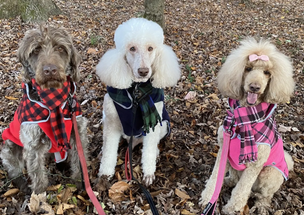23rd Jul 2024
Winter Wardrobe: Surprising Big Dogs That Need Coats
As dogs have increasingly become integral parts of our families, many pet owners find themselves wondering if their furry friends need extra protection from the cold. As winter grips the country, jackets and jumpers for dogs are becoming more common. But is this really necessary, and do dogs even like wearing them?
Should Dogs Wear Jackets in Winter?
Whether a dog needs a jacket in winter depends on several factors, including size, breed, and the local climate. According to Dr. Susan Hazel, an associate professor at the University of Adelaide specializing in animal welfare, larger dogs generally manage the cold well. Dr. Hazel explains, "Larger dogs can maintain their body heat better due to their size, so they typically don't need additional clothing when it's cold."
However, smaller dogs, especially those weighing under 10 kilograms, lose heat more quickly due to their higher surface area-to-mass ratio. For these dogs, a coat can be beneficial, especially if it's rainy or they are older and arthritic. "Smaller dogs might need a coat when it's wet or cold to help maintain their body temperature," Dr. Hazel notes.
Do Dogs Like Wearing Jackets?
There's no conclusive research on whether dogs enjoy wearing coats, but responses can vary just as they do with humans and clothing. Dr. Hazel mentions, "Some dogs may love wearing a coat, some may tolerate it, and others may dislike it." Dogs often aim to please their owners and may put up with wearing a jacket if it makes their owner happy, especially with positive reinforcement. However, if a dog has had a negative experience with wearing a coat, such as getting their fur caught in a clip, they might develop an aversion to it. "If a dog has had a bad experience, forcing them to wear a jacket can be counterproductive," Dr. Hazel advises.
Should Your Dog Sleep in a Jumper?
For indoor dogs, there's no need for pyjamas or jackets overnight. If your dog sleeps outside, providing a well-sheltered kennel is more important than dressing them in clothing. "As long as the dog has adequate shelter from wind and rain, additional clothing isn't necessary," says Dr. Hazel. Smaller dogs and those in colder climates need to be particularly well-sheltered.
Exceptions and Special Cases
While most larger dogs don't need a jacket, there are exceptions, particularly for dogs with thin coats or low body fat, such as greyhounds. "Greyhounds have low body fat and don't generate as much heat, so they can benefit from wearing a jacket," Dr. Hazel explains.
Meagan Wilson, who lives on the Gold Coast, recently bought a jacket for her greyhound, Dottie, after noticing she was cold during night-time walks. "At first, she wasn't too keen on it, but she seemed much more comfortable during our chilly beach walks," Meagan says.
Understanding Coat Needs Based on Breeds
Double-Coated Breeds
Dogs with double coats, like Siberian huskies, Alaskan Malamutes, Labradors, and Golden Retrievers, generally don't need jackets. Their thick undercoats provide excellent insulation, keeping them warm and dry in cold weather.
Single-Coated Breeds
Single-coated dogs, such as Greyhounds, Dobermans, and Dalmatians, lack the insulating undercoat and feel the cold more intensely. These breeds benefit from winter jackets when outdoors. However, it's crucial to remove the coat indoors if the house is heated to avoid overheating.
Choosing the Right Coat
When selecting a winter coat for your dog, ensure it fits comfortably and allows freedom of movement. Some coats feature reflective strips for added safety during night walks. Remember, just like humans, dogs need extra protection in cold weather. A well-chosen coat can significantly enhance their comfort and well-being during winter.
Conclusion
While not all dogs need winter coats, many can benefit from them, particularly smaller breeds and those with single coats. Understanding your dog's specific needs can help you decide whether a winter jacket is necessary. Always prioritize comfort and avoid forcing any clothing on a dog that clearly dislikes it. With the right approach, you can ensure your pet stays warm and happy throughout the colder months.

